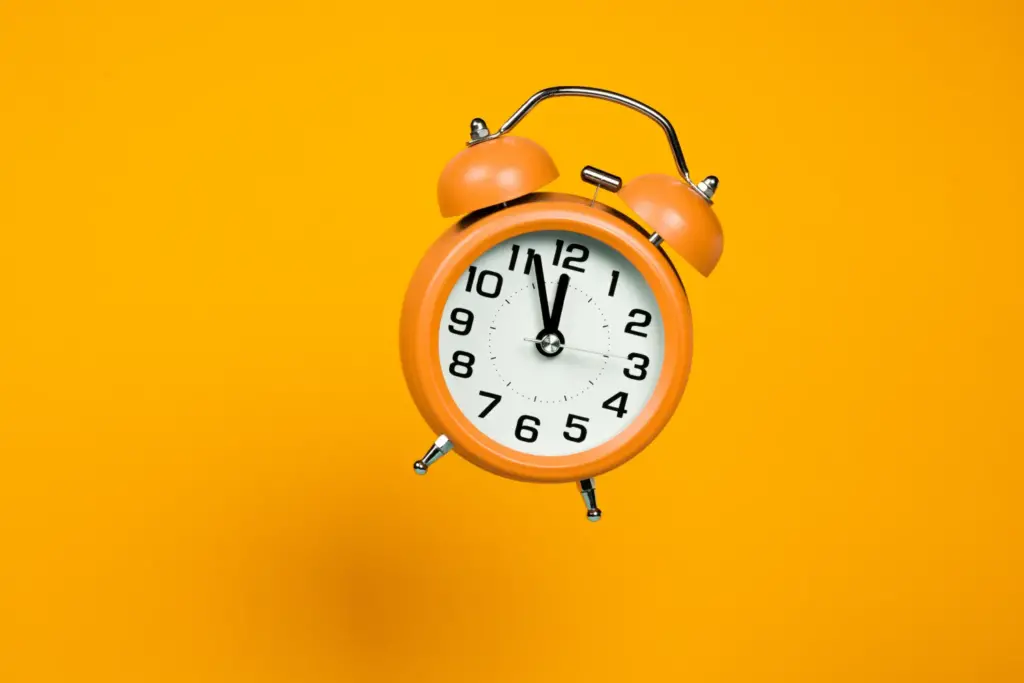Some people can set five alarms every morning and manage to sleep through them all,
while others will wake up on their own before their first alarm even has a chance to
go off.
If you’re constantly running late and starting your day with panic instead of a sense
of relaxation, we have a few ways to adjust your routine so you don’t sleep through
your alarm. You’ll be amazed at what a difference small changes can make!
What Causes Trouble Waking Up?
No one says waking up is easy — for many, it might feel like the hardest part of your
day. Trouble waking up is most frequently tied to a unique phase of the sleep-wake
cycle called sleep inertia, which exists between being asleep
and awake.
Sleep
inertia is the specific feeling of grogginess you experience right after
waking up, and too much sleep inertia can impact your ability to get up and
move, inspiring you to hit that snooze button again (or just sleep through your
alarm entirely).
What leads to a longer sleep inertia period? The direct cause is the quality of the
rest of your sleep. If you’re sleeping well at night — and getting at least seven to
nine hours of sleep — you’re generally far less likely to have difficulty in the
morning. However, if you struggle to get high-quality sleep, you may have a much
harder time waking up.
How Can You Not Sleep Through Your Alarm?
Trouble waking up is frustrating and can lead to a bad start to the day — but what
can you do to change it? We have four tips that you can put in place to get back on
track, get better sleep, and wake up on time feeling well-rested and refreshed.
Set a Sleep Schedule
A consistent, supportive sleep routine is one of the best ways to get regular,
high-quality sleep that doesn’t leave you feeling as groggy in the morning. There’s
no one right way to design a sleep schedule… as long as it’s one that you can stick
to.
When working on starting a new sleep schedule, it’s important to stick with it (yes,
even on weekends and holidays). Eventually, your sleep schedule will become an easy
habit for your body, and you’ll be able to slip into — and stay in — deep, quality
sleep.
Manage Your Stress
Psychological factors can significantly impact your quality of sleep, as well.
Everyone has had nights where they’ve found themselves lying awake worrying about
their day ahead. When you have a higher-than-average stress level, it’s important to
find ways to manage it to get better rest.
Drinking hot tea, practicing breathing techniques, and meditation can all help ease
feelings of stress and support a healthy emotional state.
Create an Optimal Sleep Environment
Your physical sleeping environment can also impact the sleep you get. Creating a
supportive sleep environment aims to minimize the distractions that will keep or
wake you up at night. This includes room
temperature, bed comfort, and ambient noise.
If your room is too hot or cold, your sheets are scratchy, or your mattress is
uncomfortable, it will keep you from getting into a deep sleep for your body to rest
and recover.
Move Your Alarm Clock
It can be just as disruptive for your sleep to hit the snooze button ten times as it
is to sleep through your alarm in the first place. Often, this is because your alarm
clock is located on your bedside table or your phone — both easily reachable places
that don’t require you to wake up fully.
Try to reposition your alarm clock across the room so you have to get out of bed to
turn it off. Even just the action of having to get vertical to address your alarm
can give you the motivation to stay awake instead of hitting snooze and going right
back to sleep.
Changing your alarms so they use new sounds every time can also help, as your body
may adjust to the usual sound of your alarm clock and make it less jarring.
Find the Root Cause
Difficulty waking up and sleep
inertia can be tricky to manage, but they don’t happen all on their own. In
almost every case, a root cause is likely triggering your difficulty waking up.
Working with a professional trained in the psychological factors that can affect your
sleep, like a cognitive behavioral therapist specializing in insomnia (a CBT-I coach), can help you determine what is
holding you back from getting your best sleep. From there, you can craft a
customized plan to address it.
When Should You See a Professional?
There’s no “right” answer for when you should see a professional — but if your sleep
issues are impacting your quality of life, it’s a good idea to schedule an
appointment with a sleep professional.
Don’t suffer through sleep issues on your own, especially if you believe there may be
a physical trigger. Seeking the right help can be life-changing.
The Bottom Line
Stop sleeping through your alarm by identifying the factors that may be causing you
to have difficulty waking up. These problems are often related to your general sleep
quality.
Stellar Sleep’s free sleep quiz can help you look
more closely at those factors, and a CBT-I coach can help you make the changes
necessary to get you to your best sleep — and easiest wake-up.
Sources:
Waking up
is the hardest thing I do all day: Sleep inertia and sleep drunkenness | PMC
Sleep
inertia: current insights | PubMed
Time to
wake up: reactive countermeasures to sleep inertia | PMC
Nighttime
temperature and human sleep loss in a changing climate | PMC






